It’s a tale as old as time: the young girl who loses her father at an early age and retreats into make-believe and roleplay; who, after seeing a great performance onstage dreams of performing herself. I write a lot about Agatha Christie, and this describes her to a t – except she never became the singer she wanted to be. She had to settle for another career, one that she practiced for over fifty years and that made her a legend. But Angela Lansbury set her sights on being an actor, found success before she turned eighteen, and practiced her trade for over seventy years. She, too, became a legend.
Only a month ago, I was asked on a friend’s podcast, “Who’s your favorite Broadway diva?” For a minute, I froze. It wasn’t Merman. It wasn’t Channing. It wasn’t Patti or Audra or Bernadette. I love them all, but it wasn’t any of them. Why couldn’t I think of the name?
A few seconds later, I said: “Of course . . . it’s Angela Lansbury.” The reason that I didn’t jump on that answer right away is simple: huge star that she was, “gay icon” that Wikipedia defines her to be, I always thought of Miss Lansbury as an actress rather than a diva. Still, my podcast host replied, “That’s who I thought you would pick.”
This year, Angela Lansbury received a Special Tony award in honor of her long career on the stage. It was presented at a special time before the actual awards took place on network television; you had to subscribe to Paramount Plus to see it. (I do, and I did.) The award was presented by a very, very old Len Cariou, who was the first Sweeney to Miss Lansbury’s Mrs. Lovett. The actress herself was unable to be there. She missed Mr. Cariou’s speech, which was poignant, a few verses of “Mame” sung by the NYC Gay Men’s Choir (a gay icon, remember?), and a standing ovation that included almost none of Miss Lansbury’s contemporaries (Chita Rivera was there, looking fabulous). Most of the old guard is gone. And now dear Angela Lansbury has joined them.
Lansbury was born in London in 1925 to an actress and a timber merchant/politician. She was nine when her father died. In 1940, mother Moyna Macgill to the family to the U.S. to escape the Blitz. In New York, Angela studied acting and by 1942 had traveled to Hollywood and was signed to a contract with MGM. At 17 she made her film debut as a vixenish Cockney maid in Gaslight. The film garnered mixed reviews, but it gave Angela critical acclaim and an Academy Award nomination.
And yet the studio wasn’t especially kind to Angela Lansbury. Despite her success in Gaslight and its follow-up, The Picture of Dorian Gray, MGM didn’t seem to know what to do with her. She languished in secondary roles, as other vixens or older sisters/friends/rivals to the leading lady, for ten years and then terminated her contract. After spending some time raising her family, she returned as a freelance actress and found herself typecast as much older characters. In 1962, she played Lawrence Harvey’s onscreen mother. Miss Lansbury was 36; Harvey was 33.
Amongst these many films were certain roles that showcased Lansbury’s brilliance and turned her back into something approaching an A-list star. She was also a regular presence on television, which would ultimately be very good to her. In the late 1950’s, she returned to the stage in Hotel Paradiso. She followed that up with A Taste of Honey, and as the film roles dried up, her demand in the theatre grew. In 1964, she made her musical theatre debut in Stephen Sondheim’s Anyone Can Whistle. How unlucky we are that the show only ran for nine performances because Lansbury’s performance there signaled the beginning of her finest period and so few people actually saw it.
Like most people, I watched Angela Lansbury big and small screens and listened to her endlessly on cast albums. Like some, I was lucky enough to see her live – twice. The first time was as Mrs. Lovett when Sweeney Todd came to San Francisco. The next was many years later when she toured as Madame Arcati in Blithe Spirit. Both times she wore her hair in unusual plaits, but the second time she was ninety and a little forgetful, and I hear that she sometimes needed to have a line fed to her through a hidden earphone. You would never have guessed it: in both productions she was transcendent.
Watching Mr. Cariou present the Tony Award to an absent Miss Lansbury no doubt filled a lot of us with a creeping sense of dread. I remember being incensed at the relative shoddiness of the tribute to her that evening: one speech and one song, delivered on a streaming service! I was upset. It felt like a eulogy. And now she’s gone, and I’m feeling bereft.
The wonderful thing about actors is that we have records of their work to turn to. Over the next few months, I intend to explore Miss Lansbury’s work, revisiting old favorites and discovering, I hope, some of the film roles I missed. Much of her work is available to stream. And if Turner Classic Movies isn’t already planning a tribute, I’d be very much surprised.
Out of all her performances, I’d like to share with you a dozen of my favorites here. Most of them you probably know, but a few may whet your appetite for a rewatch or possibly cause you to seek out something new. If you are a fan as well, I would love to hear from you as to which are your favorite roles.
* * * * *
12. The Harvey Girls (Em)
This was Lansbury’s fourth film role. She had played a sly vixen, Elizabeth Taylor’s older sister, and a tragic music hall singer. In many ways, this was a miscast: The Harvey Girls is the story of a group of heroic lasses who brave the Wild West to serve meals and find husbands. When they arrive, Lansbury’s Em is one of the few women in the town, a prostitute dance hall girl who becomes Judy Garland’s romantic rival. Except there’s no chance in hell that the leading man will choose Em over Garland’s plucky heroine.
Even though this was Garland’s twenty-second film, Lansbury more than holds her own against the star in their few scenes together. And while we never get to hear Lansbury warble (her fine singing voice ended up being dubbed), she imbues this stock character with more complexity than it deserves. For much of the film, she’s the “bad guy,” but she never overplays her hand, and when she ends up changing her tune and helping Garland win the guy she wanted, it feels like a character move rather than a musical comedy turn. Let this one represent all the earlier roles, some of which I still have to see.
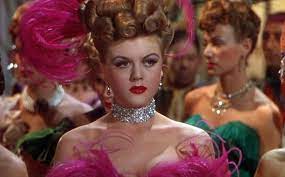
11. Dear World (Countess Aurelia)
Jean Giraudoux’ play The Madwoman of Chaillot was a satirical drama exploring the battle between commerce and art. First performed after the playwright’s death, it tells the story of the Countess Aurelia, a street character who commands a group of zany, gifted souls who flock together at a Paris bistro. When she learns that a cabal of businessmen intend to destroy the bistro in order to collect the vast reserves of oil they believe lie underground, Aurelia plots with her friends to block their ambitions and ends up leading the businessmen to their doom.
Fresh from his success working with Lansbury on Mame, composer Jerry Herman wanted to turn Giraudoux’ play into a chamber musical. But then Broadway got its hands on the piece and transformed it into a bloated mess. The production went through three directors, with the third, Joe Layton, also replacing the original choreographer. It ran from February to May, 1969, making it the slightly more successful second bomb for Lansbury. Of course, it also earned her a second Tony Award.
I have a personal experience with Dear World: it’s the only musical I ever performed in where I got to play the romantic lead. Julian is the young emissary sent by the businessmen to prepare Aurelia and Company for eviction, but he ends up falling in love with the bistro’s waitress and joining forces with Aurelia to defeat the cabal. He gets to sing the title song with Aurelia and reprises the first big number at the end.
It is easily the worst role in the show.
Of course, I did not see Miss Lansbury play Countess Aurelia. I have to rely entirely on the original cast recording. The score is pure Jerry Herman in that he had a tendency to place the same kind of song in the exact same place in each of his shows. (He also repeated the same lyrics more than once.) If Dear World is not classic Herman, it does contain some wonderful numbers, most of which Lansbury sings. (She also gets a couple of clunkers: this contains, to my mind, Herman’s weakest title number, and the eleven o’clock song “One Person” is a drag.)
But listen to Lansbury sing “I Don’t Want to Know” in the first act and “Kiss Her Now” in the second. These songs have become minor standards, but nobody I have ever heard sang them like Angela did.
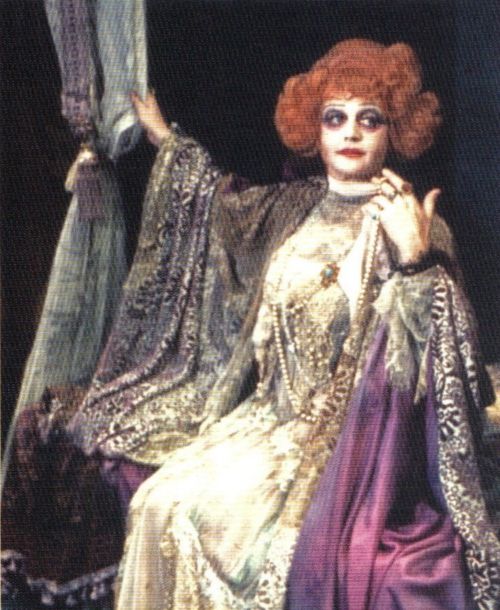
Let me live in a world full of lies with my head in the sand.”
(The Countess Aurelia, Dear World)
10. State of the Union (Kay Thorndyke)
Between 1942 and 1967, Katharine Hepburn made nine pictures with Spencer Tracy. Theirs is considered one of the classic love affairs of Hollywood lore, although I think their relationship was more complicated than that. Of all their films, the one that holds up best today, in my opinion, is Adam’s Rib (1949). It is still funny, still a wonderful look at the male/female dynamic, and the chemistry between the pair sizzles.
The year before, Hepburn and Tracy made State of the Union. It is a drama, and for much of the time Hepburn and Tracy don’t get along; in fact, they barely talk to each other. You don’t feel their chemistry so much, although in the very final moments, Tracy’s character, a political candidate who has compromised his morals in order to win, comes to his senses and gives credit – and an overdo apology – to his beleaguered wife (Hepburn). He will do the exact same thing at the end of their final film together, Guess Who’s Coming To Dinner?
What State of the Union has going for it are two things: director Frank Capra, who knew his way blindfolded around an idealistic political drama, and Angela Lansbury, who plays the villain so subtly that for a while you can almost buy that Tracy would be better off with her. (Although this issue is never ambiguous for long in a Capra film, and audiences would have expected Tracy to end up with Hepburn; the gossip columns told them so!)
Lansbury plays Kay Thorndyke, who has inherited a major newspaper syndicate from her father and wants to use its power to push her lover into the White House. To do this, she forces him to compromise his values and forces his estranged wife to appear in public with him as a happy spouse despite the wife’s awareness of the affair. Of course, Hepburn’s staunch moral decency and love for her husband despite everything pushes him at the last minute to do the right thing. We’ve seen this play out similarly (and better) in the earlier hands of Mr. Smith, Mr. Deeds, and John Doe.
To be honest, a little bit of Hepburn’s higher moral authority goes a long way here, and Lansbury is far more effective than the leering obvious villains of Capra’s 30’s films. She thinks she’s doing a good thing, both for America, her man – and, of course, herself. She loses in the very end, but she is always enthralling to watch. Plus, the role of Kay turns out to be something of a rehearsal for a greater role down the line.
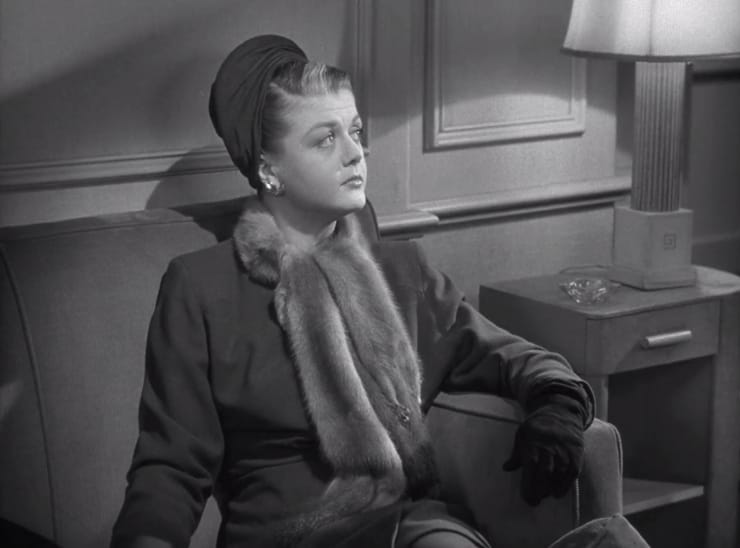
(Kay Thorndyke, State of the Union)
9. Murder, She Wrote (Jessica Fletcher)
Perhaps the series was inspired by her one-time appearance on the big screen as Miss Marple. Perhaps it was something of a consolation prize because plans to make subsequent Marple films with her fell through. The truth is that the mysteries on Murder, She Wrote had little to none of the cleverness of a Christie novel and better resembled the procedural patterns of another earlier CBS series, Perry Mason. That’s why I roll my eyes when someone suggests that Murder, She Wrote was tailor made for me.
But there is no doubt that Lansbury made that show sing (literally, on a few occasions), and her presence attracted a slew of old Hollywood players to her side, the last time I can remember a TV series doing that. The well of guest stars may have dried up midway through the series, Miss Lansbury started allowing other sleuths to step in on occasion (so did Raymond Burr), and the whole affair lasted several seasons longer than it probably should have. Still, any chance to watch Miss Lansbury onscreen is a gift.
8.The Mirror Crack’d (Miss Jane Marple)
Angela and Agatha should have worked beautifully together. And they did – only not here. This adaptation of The Mirror Crack’d from Side to Side was going for the same gold that the three previous all-star Poirot films had captured. It had the stars, all right: beside Lansbury stood “little sister” Elizabeth Taylor, Rock Hudson, Kim Novak, Tony Curtis, Geraldine Chaplin and Edward Fox. The script was quite faithful to the novel, which pleased Christie fans. The opening sequence, where Miss Marple spoils a mystery film for the rest of the village by solving it before the final scene, was marvelous. The bitchy dialogue between Taylor and Novak was fun – although not nearly as fun as the sparring of Maggie Smith and Diana Rigg in Evil Under the Sun. And the film looked beautiful.
I appreciate the seriousness with which Lansbury approached the role. She was determined to be the antithesis of the previous Marple, Margaret Rutherford, who had played the part mostly for laughs in four films in the 1960’s. But there was something about Lansbury’s portrayal that didn’t work for me: it felt weirdly subdued. As time has passed, I’ve grown more fond of her in this film, which was supposed to be the first of a three-picture deal starring Angela as Aunt Jane. But the box office proceeds told another story. The next two films were scrapped, and Lansbury went on to become Jessica Fletcher. And you know what? It all worked out in the end. She became a household name, and in 1984 we got a more suitable Miss Marple in Joan Hickson.
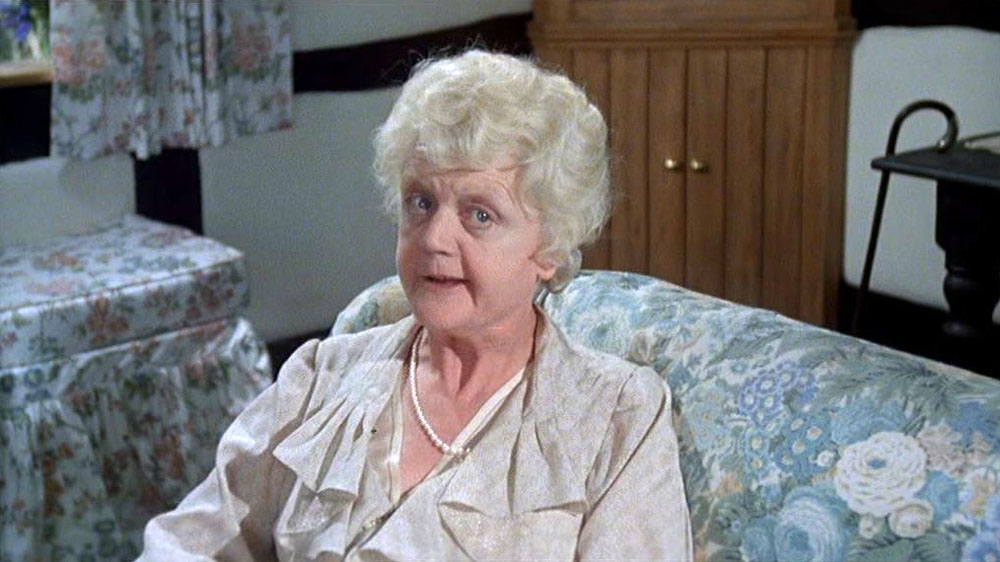
(Miss Marple, The Mirror Crack’d)
7. Beauty and the Beast (Mrs. Potts)
I know this spot should be where Gypsy goes. Lansbury went on to win another Tony award, and if you ever listen to her sing “Rose’s Turn,” you’ll understand why. But everyone who plays Mama Rose seems to win a Tony award – it’s that good a role. For me, Beauty and the Beast is something special – and Lansbury owns the best moment of it.
In the late 1980’s, 2-D animation was supposed to be dead. And then Disney revived their flailing franchise with 1989’s The Little Mermaid. That film didn’t do much for me. Oh sure, Pat Carroll is terrific as the villainous octopus, and Prince Eric is disturbingly hot. But the supporting characters don’t do much for me. And the story feels padded. And everyoneknows how I feel about the song “Part of Your World.”
Beauty and the Beast, which came out two years later, is another story entirely. Belle is maybe my favorite heroine in all of Disney. The very human villainy of Gaston is refreshing after all those witches. And the panoply of cursed servant/objects is absolutely inspired. (Years later, I would get to play one of those objects onstage – a highpoint of my life.)
Lansbury plays Mrs. Potts, the housekeeper, who of course has been transformed into a teapot. She’s part of an ensemble and has no more or less of a part to play than the rest of the ensemble does. But halfway through the film, when Belle and her Beast finally start to get along, he arranges a ball for just the two of them – and Lansbury sings the title song.
As her voice swells and the two “barely even friends” start to waltz, everything comes together: the animation, the voice work, the feelings. It’s possibly my favorite moment of cartoon cinema, and I always feel something deep in my heart when I listen to Lansbury sing that song.
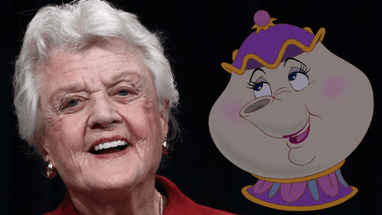
Ever a surprise
Ever as before and ever just as sure
As the sun will rise.”
(Mrs. Potts, Beauty and the Beast)
6. Anyone Can Whistle (Cora Hoover Hooper)
My own experience with Dear World makes me realize that Angela Lansbury was the reason it lasted as long as it did on Broadway. But Anyone Can Whistle is another story. Any failure of a Stephen Sondheim show is a tragedy, but the fault can be laid on others. Here, I think the script by Arthur Laurents is probably to blame; at least, that was my assessment when I saw a college production many years ago. It was also Lansbury’s assessment when she was offered the role of Cora Hoover Hooper, the mayor of a bankrupt town who resorts to nefarious means to boost her coffers, but she wanted to work with Laurents and Sondheim. She makes a snazzy, sexy mayoress/villainess, and Sondheim would store that information for fifteen years and put it to better use.
If you listen to the original cast album, your energy soars every time Lansbury sings. She basically opens the show with a jazzy, funny “I want” song (“Me and My Town”) and then follows that up with the equally hilarious “Miracle Song” (“It’s a gold mine! And it’s all mine! . . . and it’s holier than thine!”). When the plot shifts to the heroes, Nurse Fay Apple (Lee Remick) and J. Bowden Hapgood (Harry Guardino), everything gets a bit turgid and by the second act finale (there are three acts!) goes off the rails. But Lansbury lifts it up in Acts II (“A Parade in Town”) and III (“I’ve Got You to Lean On”). I only wish that the cut song “There’s Always a Woman,” for Cora and Fay, had been recorded. I would have loved to hear Lansbury sing it!
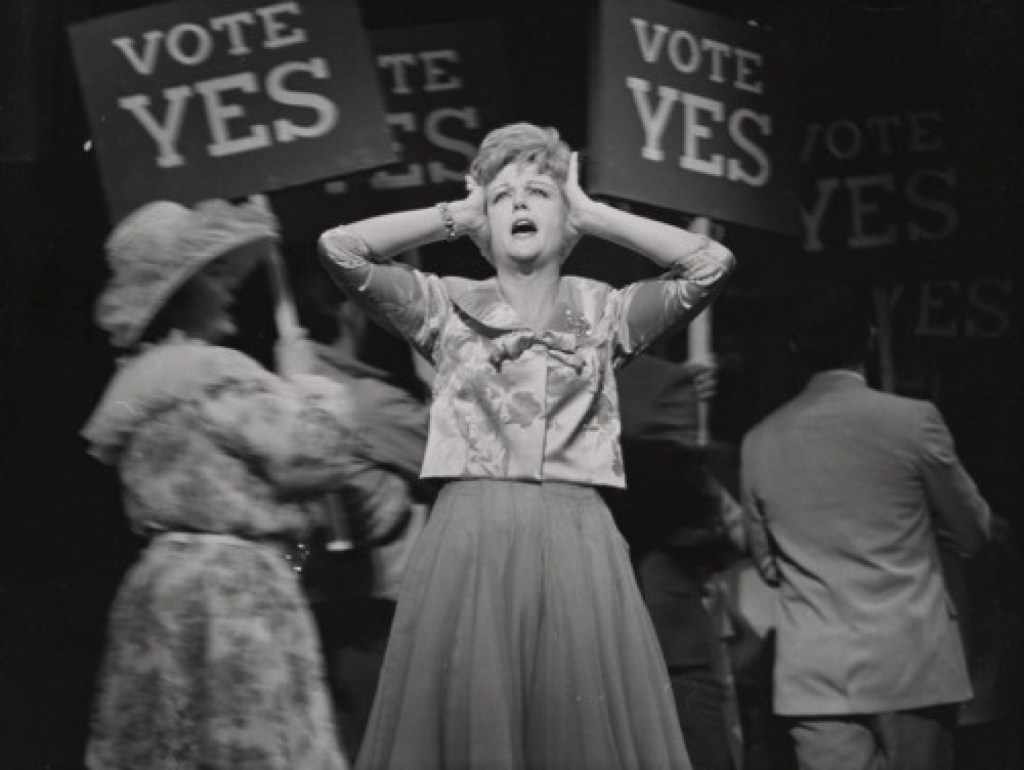
Being the mayor-ess, yes –
All of the peasants throw rocks in my presence
Which causes me nervous distress, yes –
Ooh-woo-ooh, ooh-wooooh-hoh!”
(Cora Hoover Hooper, Anyone Can Whistle)
5. The World of Henry Orient (Isabel Boyd)
This may be the one that most people are unaware of. It has been a favorite film of mine since childhood. When I was a kid, it had to do more with the fact that the film is about being a kid and growing up. Now it’s all about Angela Lansbury.
I’ll admit that this 1964 film is problematic, and you should know that going in for the first time. It is stuck in its time in its depiction of an all-white New York City and some brief comedy that can’t help striking a racist chord. It revolves around two girls on the cusp of becoming teenagers: Marian “Gil” Gilbert (Merrie Spaeth) lives with her divorced mother and mom’s divorced friend Boothy (played delightfully by Broadway actor Bibi Osterwald). She is enrolled in a very modern private school and likes nobody there – until she meets Valerie “Val” Boyd (Tippy Walker), the neglected daughter of a millionaire businessman (Tom Bosley) and his jet-setting wife (Lansbury).
The two girls strike up a close friendship that centers a lot around their fascination for a local character, the pretentious and untalented pianist Henry Orient (Peter Sellers). They form a fan club and attempt to follow him around, which interferes with Orient’s attempts to seduce a married woman (the hilarious Paula Prentiss). And that’s how the first half of the film goes: the kids are adorable, and Sellers, Prentiss and Osterwald provide the comedy for the adults.
Halfway through the film, Val’s parents return to New York, and Lansbury takes over the film. It’s not a huge part, but Lansbury had recently proven how brilliantly she could portray a monster mother. She’s awful in a different way here, but in her treatment of her husband and daughter, she is truly, wonderfully awful. I still get chills at the end when she receives her much-deserved comeuppance from Bosley. Henry Orient isn’t perfect, but here Angela Lansbury certainly is.
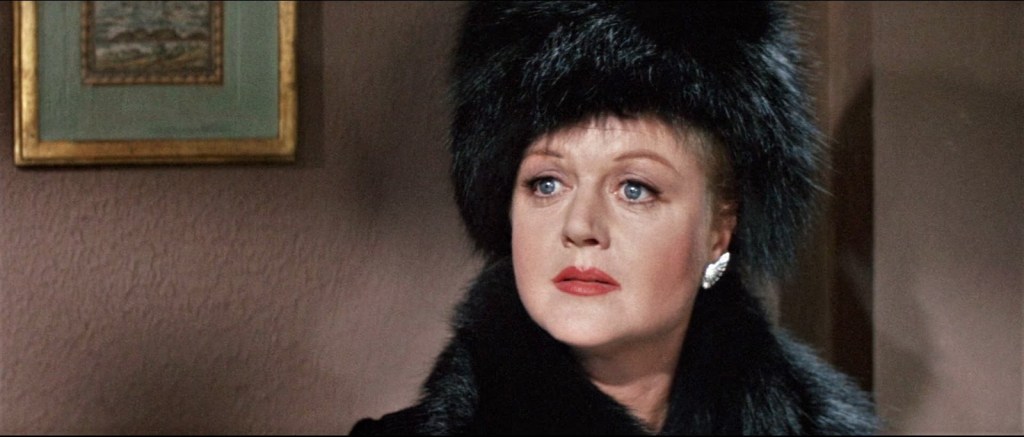
(Isobel Boyd, The World of Henry Orient)
4. Mame (Mame Dennis)
In 1955, Patrick Dennis wrote a hilarious “autobiographical” novel called Auntie Mame, which was made into an equally funny Broadway play the following year. Rosalind Russell perfectly embodied the eccentric vain-but-loving seeker of the high life who won’t let anything get her down, not the Depression, not widowhood, not the abandonment of her beloved nephew. She reprised this role in a 1958 film that is also wonderful – which is great because very few people will tackle the play anymore; the scenic and costume production needs alone would bankrupt any company.
Very few companies will produce Mame, the musical version of Dennis’ book and Jerome Lawrence and Robert Edwin Lee’s play and film for this same reason – and for another: it’s not actually very good. If you watch Mame – and I have several times – it feels like a shell of the original, with some of the best bits shoved in between a bunch of musical numbers. Those numbers are some of Jerry Herman’s best. But they can’t compete in sophistication and wit for their source material; that wasn’t what Jerry Herman was all about. And there are almost too many songs! Why follow a huge production number (“It’s Today”) with yet another (“Open a New Window”)? Why be so stingy with the humor for Vera Charles (embodied so beautifully by Bea Arthur)?
Still, this is Lansbury’s moment – and it’s unbelievable that she had to travel across country months after auditioning for the role, confront the producers and demand they either cast her or let her go! There are ancient, hard-to-see clips of her performance on YouTube, but it’s clear that she commands that stage, from her first entrance on that staircase, waving a bugle in her hand, to her eleven o’clock torch song, perhaps Herman’s best, “If He Walked Into My Life.” You can watch a clip of Lansbury and Arthur at the Tony’s singing “Bosom Buddies” and elevating good jokes into hilarity. That’s what Lansbury does so brilliantly: with her performance she elevates a so-so libretto with a better score into something that ran on Broadway for nearly four years, although Lansbury left the production in 1968. She tried to reproduce the magic in a 1983 revival, but I think audiences responded to the musical rather than the actress, and the show closed after 41 performances.
For the movie, Warner Brothers ended up casting Bea Arthur and Jane Connell (who replaced Madeline Kahn) from the Broadway production, but they decided to nix Lansbury and cast a bigger name, Lucille Ball. She couldn’t sing. Critic Gene Siskel described the film as “a total bust, devoid of joy, wit, good music, or decent dancing.”
Hollywood is full of jackasses.
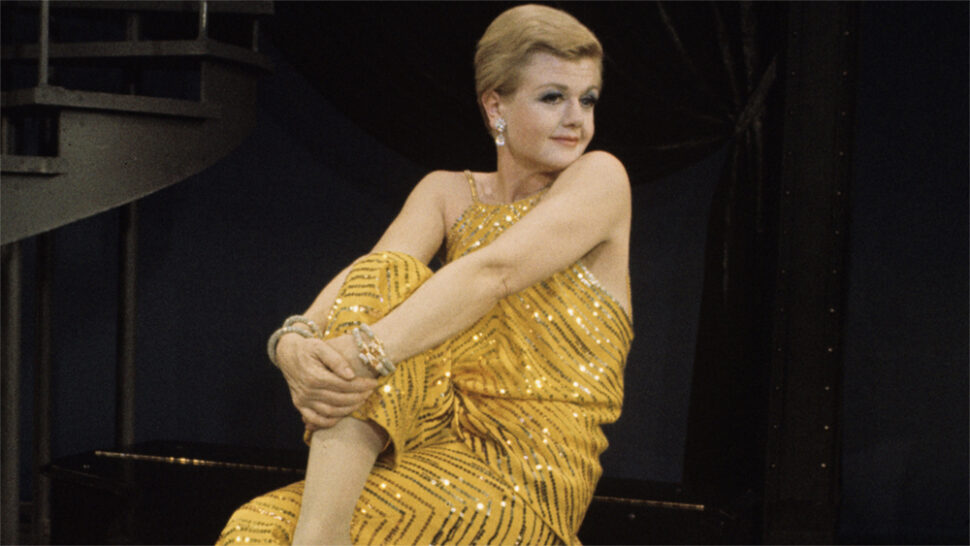
And though it’s far from the first of the year,
I know that this very minute has history in it,
We’re here!”
(Mame Dennis, Mame)
3. Sweeney Todd (Mrs. Nellie Lovett)
For her third Tony-winning role, Lansbury traded glamor for the grotesque, and she produced one of the best grotesques in Broadway history. This time, she didn’t need to elevate the material. I have seen many actresses play Mrs. Lovett, including Patti Lupone, Judy Kaye, and two glorious ex-students named Heather. Lupone and Kaye leaned heavily into the darkness of the purveyor of human-filled meat pies; Lansbury remembered the “love” in Lovett. She made this lying, cheating, self-centered murderess . . . loveable.
She was 53 when she first played Mrs. Lovett, and she has the stamina of a much younger woman. Listen to her breath control during “The Worst Pies in London” or “God, That’s Good.” She was brilliant as the comedy relief and voice of “reason” opposite all her Sweeneys (I prefer Cariou, but I saw George Hearn, who was great). Yes, she harbors a big crush on Sweeney, but Mrs. Lovett is perfectly sane . . . which is why I had some problems with the Michael Cerveris/Patti Lupone production set in an asylum. I think part of the greatness of Sweeney is how it juxtaposes the terror of madness with the multitude of horrors evoked by lust and greed and other human endeavors. When Mrs. Lovett decides to cook Pirelli and a host of other unwitting customers, she isn’t crazy; she’s making a business decision that she knows will please “her” man.
Everyone knows Lansbury could be dark and and evil and vicious. She manages to be all of these things and yet remain . . . if not sympathetic, then so outrageously funny that you can’t help but like her. And if she gets exactly what she deserves in the end, well . . . Lansbury’s was the only Mrs. Lovett I felt I would miss after she was gone. I was so grateful to watch her perform this live. Her performance was electric. Audience members left that production in droves, incensed by the material. They should have all been rounded up by the ushers and served as refreshments after the show.

Does a business but I notice somethin’ weird
Lately all the neighbors’ cats have disappeared
Have to hand it to her, wot I calls
Enterprise poppin’ pussies into pies!
Wouldn’t do in my shop
Just the thought of it’s enough to make you sick,
And I’m tellin’ you them pussycats is quick . . . “
(Mrs. Lovett, Sweeney Todd)
2. Death on the Nile (Salome Otterbourne)
Arguably the best adaptation of an Agatha Christie novel so far, Death on the Nile took the concept begun by Murder on the Orient Express – the all-star cast, the glamor, the respect for the author herself and the classic mystery tropes she worked with – and went one better by loosening things up and having fun!
This is the best ensemble of actors ever gathered to enact a Christie story. True, I may have a problem with Lois Chiles as Linnet, and Mia Farrow certainly doesn’t look like Jackie. But she plays it perfectly, and Simon MacCorkindale is suitably handsome and earnest as Simon. It’s the rest of the cast that shines from the pairing of Ustinov and Niven as Poirot and Colonel Race to the Hollywood royalty that populates most of the cabins on the S.S. Karnak. Even the younger generation of Jane Birkin, Olivia Hussey, and Jon Finch are fine.
Yes, I love the banter between Bette Davis’ Miss Van Schuyler and Maggie Smith’s Miss Bowers. The film takes away Miss VS’ niece and promotes Miss Bowers to a major suspect with a motive and everything, but the real joy is in watching them attack each other.
However, from the moment she is first spotted leering at Linnet and Simon at the hotel, Lansbury steals the film as the drunken, failed romance novelist Salome Otterbourne. Those costumes! That eye make-up that makes her look like the little hound in the Warner Brothers cartoons. Her hilarious flirting, combining lewdness and alcoholism. Like Mrs. Lovett, Salome meets a brutal end, and it’s fitting that after she goes, pretty much every line thereafter is spoken by Ustinov’s Poirot. Without Lansbury on the screen, this filmic crocodile loses a bit of its “croc!”
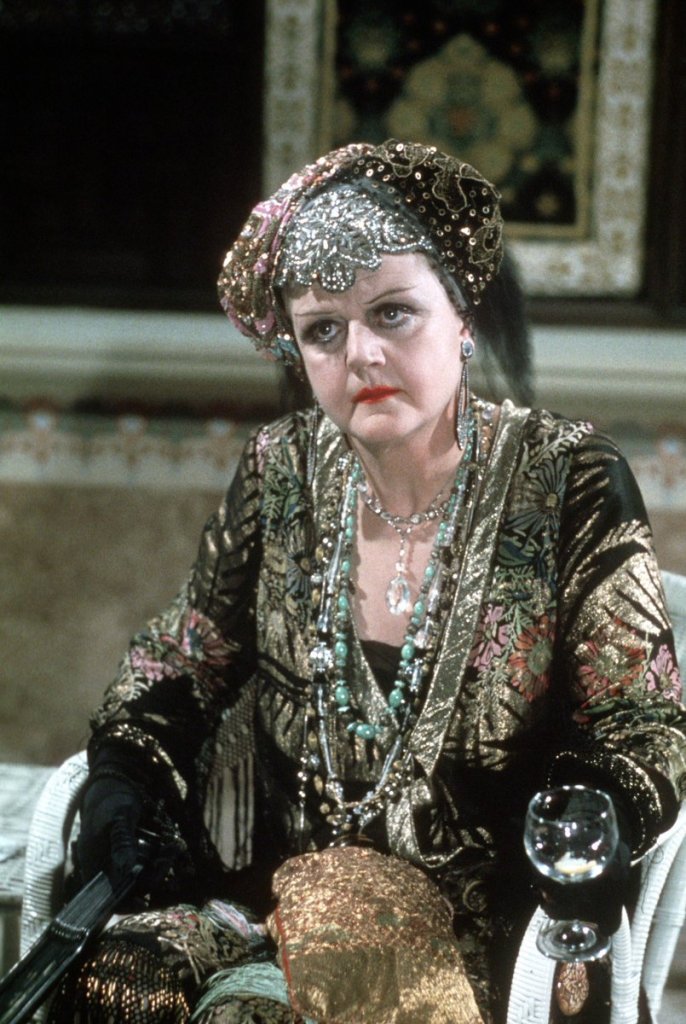
(Salome Otterbourne, Death on the Nile)
1. The Manchurian Candidate (Mrs. Johnny Iselin)
This is one of my favorite all-time films, meaning I can return to it regularly and feel like I am watching it for the first time. If you have gotten this far in my ramblings and have never seen The Manchurian Candidate, then I will not spoil it for you. It’s a brilliant Cold War nightmare, and Angela Lansbury is at the heart of it! One of these days I’ll write something more about it, but for now . . .
Everyone is brilliant here, even Frank Sinatra, so what are you waiting for? This is Lansbury’s best role of all time, and it is happily preserved for the ages. Go and watch it now, then come back and we can discuss it in the comments section.
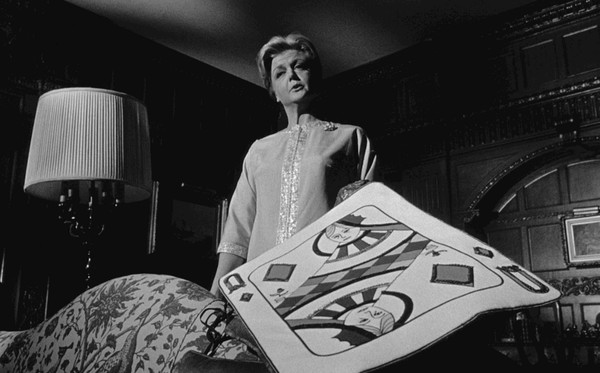
(Mrs. Iselin, The Manchurian Candidate)
The holiday film I am most excited about is Rian Johnson’s Glass Onion, the sequel to Knives Out. According to Wikipedia, Angela Lansbury appears in this film as . . . “Herself.” If this is the last time we see her in something new onscreen, it will add a sweet, sad touch to this much anticipated film.
Meanwhile, there are dozens of performances and recordings to go through and a seventy-plus years career to celebrate. Thank you, Miss Lansbury, for the laughs and the shivers and the immense joy you brought throughout your lifetime. You are loved by millions. You will be missed.
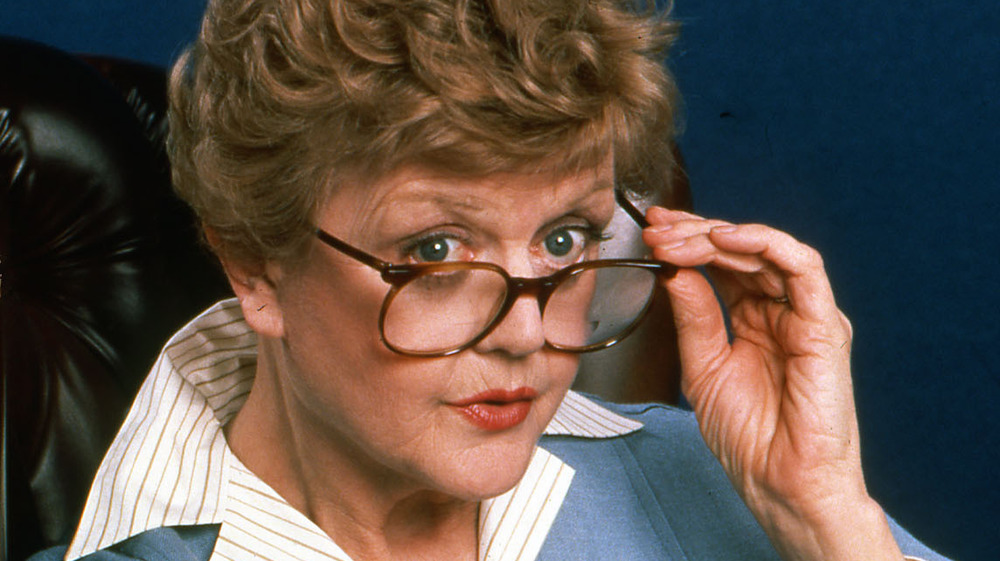
She had such a small role in The Picture of Dorian Gray but she was luminously beautiful when she was young (and still so later in life for anyone who took the time to really look) that my image of her is always that one, first and foremost. But I just recently rewatched Death on the Nile and she was ideal as Salome.
LikeLiked by 3 people
She played Sybil Vane brilliantly despite her young age. Her portrayal of an innocent young woman had so much depth and subtly that I have been angry with Hurd ever since for breaking her heart. The tango scene with David Niven was hilarious. I laugh every single time I watch it. And, the scene with Ustinov and Niven in the bar, though short, reveals her unparalled skill as an actress. I don’t think I’ve ever seen someone play someone who’s sloshed better. The line ‘this crocodile has lost it’s croc’ is priceless.
LikeLike
A fine tribute Brad. An amazing actor. However, Peter Ustinov (only 4 years older than Lansbury after all) was married not to her mother but to her half-sister, Isolde Denham.
LikeLiked by 1 person
Damn Wikipedia!!!!
LikeLike
I am forever tweaking the pages there 🙄
LikeLiked by 1 person
Here is a blog post that thoughtfully picks out the Murder, She Wrote episodes that actually are well-constructed mysteries. Tommy manages to find 10 of those, at least. A few more are mentioned in the comments (in which I participated).
LikeLiked by 3 people
This is wonderful! Thank you, Rinaldo!
LikeLiked by 1 person
I happened to rewatch the MSW Season 2 episode “Trial by Error” last night, thanks to Peacock. As I said on that other blog, it’s an absolute corker. It might have been a good basis for a novel — except that it’s exactly the right complexity and density to make a one-hour TV episode. Very much recommended.
LikeLike
One of my earliest film experiences was going to a re-release of BEDKNOBS AND BROOMSTICKS – I loved it and got my folks to get my bedroom the wallpaper featuring the cartoon animals from the football match sequence. They were my brother and mine’s friends for years.
LikeLiked by 3 people
Brad – I had a lump in my throat when I learned that Angela Lansbury passed away even after a full life just five days short of her 97th birthday. I enjoyed reading your tribute though. It is the kind of thing you do so impressively on your blog. Thank you.
In multiple interviews, I have seen Lansbury refer to herself as a character actress. While she didn’t seem to mind not being a Hollywood glamour girl, there was a wistful tone to her remarks that she was never viewed as a leading lady there. Fortunately, the theater and television changed that.
Finally, I have to admit that I like Murder She Wrote despite the uneven episode quality through its 12 year run plus four made for TV movies. The better episodes are fair play like Trial & Error, Snow White / Blood Red, It it’s Thursday it must be Beverly, Mirror Mirror on the Wall, etc. and are well done. The later seasons too often resort to Jessica exposing the culprit not by (fair play) evidence and deduction, but by tricking the killer using false information as bait diluting the mystery and fun for the viewer.
Regardless, Lansbury was radiant in each episode … principled, assertive, clever. I saw an interviewer ask Lansbury if she was like Jessica Fletcher to which she replied, “No, but I certainly might have been if I hadn’t been an actress”.
LikeLiked by 2 people
In the book Nothing Like a Dame (I have it on Kindle), Eddie Shapiro interviews 21 Tony-winning musical theater ladies. Most of them are generous and pleasant, a couple sometimes veer into hostility (no prize for guessing which one) or vagueness (ditto), but of them all, Lansbury stands out for the warmth of her welcome and her unguarded honesty. Just as one would hope.
She also touches on the notion mentioned, that her screen career was perhaps not all it might have been. “And let’s face it, I have never been an easy person to cast. Not in movies, no. Not in television. Not in the theater for that matter. I was always somewhat of an odd quantity. A quantity of talent, yes, that was proven, but a little off center. I really didn’t fit into the average groove as a leading lady or as a secondary figure in a setup. … I wasn’t an easy person to cast. Ever. And I am not to this day.”
And then, on the topic of feeling that her movie career wasn’t what it might have been: “What was interesting about Hollywood, and I don’t mean to be mealy-mouthed about it, but I never got an Emmy in all the years. What does that tell you? It says that the people who voted in Hollywood never watched Murder She Wrote. It was a worldwide success and it got Golden Globes. I got about three of them, actually, but never an Emmy. Every other actress who did a series of any length got at least one Emmy. It became a joke! What I am saying is that a prophet is without honor in their own town and that was the case with me in Hollywood. I couldn’t get arrested, I couldn’t get a role. I wasn’t considered for parts. I didn’t exist as far as movies were concerned, except in the early days when unique and marvelous directors gave me great roles—not great starring roles, but great roles, which suited me down to the ground in those days.”
LikeLiked by 4 people
I loved reading this! It made me want to find Shapiro’s book AND to re-read Lansbury’s authorized biography, Balancing Act, written by Martin Gottfried, which I have. She managed to look at her life dispassionately, with accuracy but without complaining.
I remember seeing a godawful interview with her on The View, where Joy Behar kept throwing out questions about how disappointing her career had been. Lansbury handled the whole thing with grace and aplomb, trying to talk about whatever show she was there to talk about and about some of her many high points in film and onstage. She evaded questions about her private life and was thoroughly delightful, even as her interrogators tried to move things into tabloid territory.
LikeLiked by 1 person
I’m glad you thought this did some justice to Lansbury, Scott. I’ve been feeling blue for days now. Thanks for your suggestions of MSW episodes, and there’s more, thanks to Rinaldo.
I think it was in the NYTimes where I read that one of the reasons Lansbury was so admired was “her lack of neediness.” If she poured anything of herself in her roles, she kept it private. She was a real person, and we all loved her for it.
LikeLiked by 1 person
I must have watched Bedknobs and Broomsticks 100 times as a kid. Everyone thinks it’s inferior to Mary Poppins but I enjoy it more and Lansbury is most of the reason why.
LikeLiked by 2 people
Richard, I confess that B&B never appealed to me. It felt like a lesser retread of Mary Poppins for a multitude of reasons. I will obviously have to give it a revisit.
LikeLike
I don’t know if it’s widely known that Angela Lansbury finished her film career with an appearance in a whodunit film (yet to be released). I think you know which one I mean, and it promises to at least compete as the best GAD-related project with which she was ever involved, far surpassing the MacDonald’s of Murder, She Wrote, and even the caviar of Death on the Nile— even if it turn out to be only a cameo.
LikeLiked by 3 people
Well, I spoiled that one in my article, but I was equally excited to hear about it and will be even more excited to see the film and find her there.
LikeLike
Lovely piece, thank you. Still have chills from her performance in the Manchurian Candidate, one of the best performances and films of all time. And love Salome Otterbourne in Death on the Nile, often watch it just for her. I think that Lansbury’s half sister married Peter Ustinov, not her mother. You may want to check this.
LikeLiked by 2 people
Oh, I’ve already been scol-, er, corrected on that above. Did you know that Wikipedia gets things wrong?!?
LikeLiked by 1 person
What a glorious tribute to the great Angela Lansbury. In addition to her great talents, what a beauty she was. I thoroughly agree with your list of favorites, though her Miss Marple didn’t really hold a candle to Joan Hickson’s. Nevertheless, RIP Angela Lansbury and Jessica Fletcher.
LikeLiked by 1 person
Don’t laugh but a favorite of mine is Bedknobs and Broomsticks. I saw it when I was 9 years old, I still remember we went to the drive in. My Mom put me in my pajamas and my dad put my kid brother in his. We had dinner from a basket that my mom packed, and Dad went to get some popcorn for us, so it was real theater popcorn. And then the movie came on and it was magic. Really. I loved it. I saw it recently, we just got Disney/Hulu and a sports channel, and it still stands up. It is still fun and beautiful, and Angela is just magic. Especially when she is dancing and singing. I never saw her on stage, but I saw her at every Tony awards. And I agree they should have done a lot more in tribute to such a great lady.
LikeLiked by 1 person
I promise I won’t laugh! B&B is not a favorite of mine, but you are not alone among both Lansbury and Disney fans who love that movie! And I love the family memory that film gives you! I have a few of those myself! ❤️
LikeLike
Thank you, it is a sweet memory rather precious since there are really few drive-ins anymore. Sort of sad. The other movies I have childhood memories of are The Harvey Girls and The World of Henry Orient. Though I always remembered that Angela was in both and wonderful in them, as I child I completely separated her in B&B from the other two. I mean she was essentially the bad guy in both, though Em becomes sweet at the end, accepts her and helps her, so I liked her better. In WOHO she is just a complete creep and deserves what happens to her. The way she treats her daughter is child abuse, I realized later. Anyway, thank you for your kind remarks. Have Happy Holidays!
LikeLike
Thank you for this beautiful tribute, Brad, even though I am finding it months later. I am still not over the loss of this talented, radiant, transcendent woman. I don’t think that I ever will be. She was so remarkable that we feel that even her 96 years among us were somehow too few. As you said, thank goodness we still have her body of work! Thanks so much once again for this beautiful post.
LikeLike